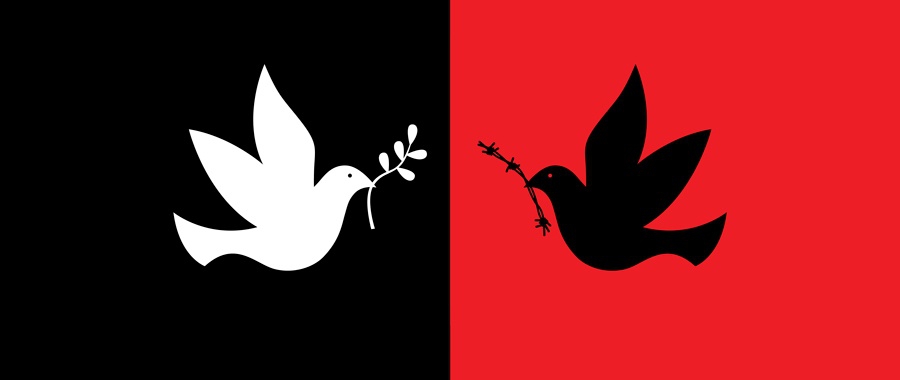The views expressed in our content reflect individual perspectives and do not represent the authoritative views of the Baha'i Faith.
“Peace,” the Baha’i teachings say, is “the foundation of the religion of God.” – Abdu’l-Baha, Selections from the Writings of Abdu’l-Baha
Some might take exception to that statement because, yes, the followers of past religions haven’t always acted peacefully. Men have utilized religious teachings as an excuse for war from time immemorial, always claiming that God is on their side. The clergy and leaders of various religions have even promoted war in the past, and some still do.
In fact, much of the world’s history tells the story of protracted religious wars like the Crusades, when those of different beliefs fought for the supremacy of their religions, literally for centuries. So with that history in mind, does religion cause war or peace?
Going back to the original teachings of most of the world’s great Faiths can help us answer that question. When first established, the major religions of the world counseled believers to quell their violent instincts and to walk in peace with all people:
Let man find the path of the Spirit: who has found this path becomes free from the bonds of evil. Who knows this has found peace; he is the lord of himself … – The Hindu Upanishads
Peace is great because peace is to the earth what yeast is to bread. If the Holy One, blessed is He, had not given peace to the earth, swords and men, like the beasts of the fields, would destroy the world. – The Talmud
… weapons are things of ill omen. The man of enlightenment does not use them except when he cannot help it. His great desire is peace, and he does not take joy in conquest. To joy in conquest is to rejoice at the loss of human life. He who takes joy in bloodshed is not fit to govern the country. – the Tao Te Ching
I Deganawidah and the chiefs of our Five Nations of the Great Peace, we now uproot the tallest pine and beneath it we cast all weapons of war.
Deep into the earth, into the underworld … we cast all weapons of war. We banish them from sight forever … and replant the tree … Thus shall the Great Peace be established. – Deganawidah, the Iroquois Peacemaker.
But the wisdom from above is pure, first of all; it is also peaceful, gentle, and friendly; it is full of compassion and produces a harvest of good deeds; it is free from prejudice and hypocrisy. And goodness is the harvest that is produced from the seeds the peacemakers plant in peace. – James 3:17-3:18.
Shall I not tell you what is better than prayers and fasting and giving alms to the poor? It is making peace between one another: enmity and malice destroy all virtues. – Muhammad, from a Muslim hadith
Then, after the founders of these great Faiths passed away and the influence of their messages of peace gradually waned over time, each religion declined and fell prey to hostile and violent forces, used as a pretense for war:
… the establishing of the divine religions is for peace, not for war and the shedding of blood. Inasmuch as all are founded upon one reality which is love and unity, the wars and dissensions which have characterized the history of religion have been due to imitations and superstitions which arise afterward. Religion is reality, and reality is one. The fundamentals of the religion of God are, therefore, one in reality. There is neither difference nor change in the fundamentals. Variance is caused by blind imitations, prejudices and adherence to forms which appear later; and inasmuch as these differ, discord and strife result. – Abdu’l-Baha, The Promulgation of Universal Peace
The beautiful religious teachings on peace, the Baha’i writings say, have now been verified, restated and re-vivified by the new spiritual impetus of the Baha’i revelation, which has as its chief aim the establishment of universal peace and the eradication of war:
These blind imitations are contrary to the fundamental basis of the divine religions, for the divine religions in their central and essential teaching are based upon unity, love and peace, whereas these variations and imitations have ever been productive of warfare, sedition and strife. – Abdu’l-Baha, The Promulgation of Universal Peace
Baha’is believe that Baha’u’llah brought a new message of peace to the world, emphasizing non-violence, demilitarization and a global system of governance, all in the name of establishing a permanent, universal end to war:
The Sun of Truth hath risen above the horizon of this world and cast down its beams of guidance. Eternal grace is never interrupted, and a fruit of that everlasting grace is universal peace. Rest thou assured that in this era of the spirit, the Kingdom of Peace will raise up its tabernacle on the summits of the world, and the commandments of the Prince of Peace will so dominate the arteries and nerves of every people as to draw into His sheltering shade all the nations on earth.
… peace must first be established among individuals, until it leadeth in the end to peace among nations. Wherefore, O ye Baha’is, strive ye with all your might to create, through the power of the Word of God, genuine love, spiritual communion and durable bonds among individuals. This is your task. – Abdu’l-Baha, Selections from the Writings of Abdu’l-Baha
You May Also Like
Comments

















Let's hope so! Blessed are the peacemakers, for they shall be called sons of God. The Spirit of God is the Spirit of Peace. „Shalom“ does not mean the absence of trouble and challenges, but the peace of God in the midst of it. Trouble visits the house of every heart sooner or later. Peace is the divine art of dealing with troubles.